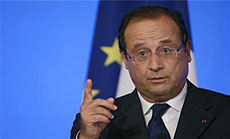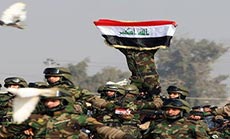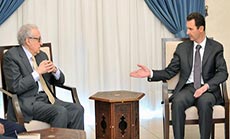"Israelis" continue blame Ping-pong over Lebanon war

Source: Haaretz, 21-01-2008
Meretz MK Zahava Gal-On, making public on Monday the testimony of cabinet ministers to the Winograd Commission, which is investigating the conduct of the Second Lebanon War, said the ministers clearly placed the onus on Prime Minister Ehud Olmert for the decision to order a ground offensive during the final 48 hours of the conflict.
Gal-On called on the prime minister to resign. The ground offensive resulted in large numbers of "Israeli" Military Forces casualties, and the decision to order the move at the close of hostilities has been seen as one of the primary failings of "Israel's" conduct of the war.
The full report of the panel is to be released on January 30. Olmert has gone on record as stating that he would stay in office regardless of the report's findings. Defense (War) Minister Ehud Barak, leader of the Labor Party, the main coalition partner of Olmert's ruling Kadima, has declined to state if he will make good on past pledges to take the party out of the government when the report is released.
According to Gal-On, whose petition to the High Court of Justice allowed the testimony to be made public, all of the ministers testified that they opposed the decision or were unaware of it, and all clearly fixed responsibility for the offensive on the prime minister.
Gal-On told Army Radio Monday that she is not calling for new elections or for the dissolution of the cabinet, but added that Olmert must take responsibility and resign.
"The testimony clearly fixes the responsibility on the prime minister, and lays bare all the failures which accompanied the decision to move to a ground offensive. It emphasizes the necessity for the prime minister to resign."
At a news conference at the Knesset, Gal-On said that "many cabinet ministers voted contrary to their conscience due to the weight of the stature of the prime minister and the backing they were interested in granting him."
Gal-On cited the testimony of cabinet minister Benjamin Ben-Eliezer, who was asked by the panel as to the logic of the ground operation. "I don't know, I have no idea," he replied. "You're asking me a question which I myself asked. And I think that the operation was unnecessary."
Then-deputy defense (war) minister Ephraim Sneh told the committee that he was not involved in the decision. "If my vote had been the decisive, I would have voted against," Sneh testified.
Ophir Pines, who served as minister of culture at the time of the war, testified that "this operation should never have taken place."
Olmert himself told the inquiry panel of the decision, "That was the most difficult moment. Afterward, I understood the meaning of loneliness, with a double responsibility on my shoulders. I looked around, there was no one, and only I would decide."
Gal-On said that the prime minister's motive in ordering the ground offensive was "to achieve a 'victorious picture' and to improve the public's morale. This was a negligent decision on the prime minister's part."
Meretz MK Zahava Gal-On, making public on Monday the testimony of cabinet ministers to the Winograd Commission, which is investigating the conduct of the Second Lebanon War, said the ministers clearly placed the onus on Prime Minister Ehud Olmert for the decision to order a ground offensive during the final 48 hours of the conflict.
Gal-On called on the prime minister to resign. The ground offensive resulted in large numbers of "Israeli" Military Forces casualties, and the decision to order the move at the close of hostilities has been seen as one of the primary failings of "Israel's" conduct of the war.
The full report of the panel is to be released on January 30. Olmert has gone on record as stating that he would stay in office regardless of the report's findings. Defense (War) Minister Ehud Barak, leader of the Labor Party, the main coalition partner of Olmert's ruling Kadima, has declined to state if he will make good on past pledges to take the party out of the government when the report is released.
According to Gal-On, whose petition to the High Court of Justice allowed the testimony to be made public, all of the ministers testified that they opposed the decision or were unaware of it, and all clearly fixed responsibility for the offensive on the prime minister.
Gal-On told Army Radio Monday that she is not calling for new elections or for the dissolution of the cabinet, but added that Olmert must take responsibility and resign.
"The testimony clearly fixes the responsibility on the prime minister, and lays bare all the failures which accompanied the decision to move to a ground offensive. It emphasizes the necessity for the prime minister to resign."
At a news conference at the Knesset, Gal-On said that "many cabinet ministers voted contrary to their conscience due to the weight of the stature of the prime minister and the backing they were interested in granting him."
Gal-On cited the testimony of cabinet minister Benjamin Ben-Eliezer, who was asked by the panel as to the logic of the ground operation. "I don't know, I have no idea," he replied. "You're asking me a question which I myself asked. And I think that the operation was unnecessary."
Then-deputy defense (war) minister Ephraim Sneh told the committee that he was not involved in the decision. "If my vote had been the decisive, I would have voted against," Sneh testified.
Ophir Pines, who served as minister of culture at the time of the war, testified that "this operation should never have taken place."
Olmert himself told the inquiry panel of the decision, "That was the most difficult moment. Afterward, I understood the meaning of loneliness, with a double responsibility on my shoulders. I looked around, there was no one, and only I would decide."
Gal-On said that the prime minister's motive in ordering the ground offensive was "to achieve a 'victorious picture' and to improve the public's morale. This was a negligent decision on the prime minister's part."
Comments
- Related News

France’s Hollande in Qatar for Warplane Deal
10 years ago
Iraq Police Dismantles Al-Qaeda Protest Site
11 years ago

